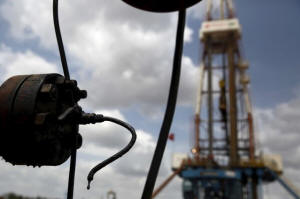|
Brent oil breaks above $50 for first time
in seven months
 Send a link to a friend
Send a link to a friend
 [May 26, 2016]
By Karolin Schaps and Ron Bousso [May 26, 2016]
By Karolin Schaps and Ron Bousso
LONDON (Reuters) - Brent oil futures
climbed above $50 a barrel on Thursday for the first time in nearly
seven months as a global supply glut that plagued the market for nearly
two years showed signs of easing.
Oil prices have rallied in recent weeks after a string of outages,
due mainly to wildfires in Canada and unrest in Nigeria and Libya,
knocked out nearly 4 million barrels per day of production.
Above $50 a barrel, oil was seen by many market players as breaching
a psychological barrier that could lead producers, particularly
among U.S. shale companies, to revive operations scrapped in recent
years.
Global benchmark Brent crude oil <LCOc1> was up 36 cents at $50.10 a
barrel at 1110 GMT, the highest in nearly 7 months, after a
larger-than-expected draw in U.S. crude oil inventories last week
indicated buyers are starting to mop up spare supply.[EIA/S]
U.S. crude futures <CLc1> were up 29 cents at $49.85 a barrel, after
touching $49.97, the highest since mid-October.
 "Certainly ($50) is a psychological barrier. There is a momentum,
people will try and push it up over that," said Ric Spooner, chief
market analyst at Sydney's CMC Markets.
A source at oil producer Chevron said on Thursday its activities in
Nigeria had been "grounded" by a militant attack, worsening a
situation that had already restricted the supply of hundreds of
thousands of barrels.
A meeting of the Organization of the Petroleum Exporting Countries
on June 2 in Vienna to discuss the oil market added further support.
[to top of second column] |

Crude oil drips from a valve at an oil well operated by Venezuela's
state oil company PDVSA, in the oil rich Orinoco belt, near Morichal
at the state of Monagas April 16, 2015. REUTERS/Carlos Garcia
Rawlins/File Photo

However, the recent rise in oil prices and friction between key
members Saudi Arabia and Iran mean a coordinated effort to intervene
to support prices is slim.
"A (production) freeze remains a tail risk, but a very small one.
The bigger risk is that following the meeting Saudi will increase
production to meet rising summer domestic demand, to preserve market
share in its oil wars with Iran and Iraq," David Hufton, head of PVM
Oil brokers, said.
"These are all compelling reasons to expect Saudi production to rise
over the summer months."
(Additional reporting by Keith Wallis in Singapore; Editing by Dale
Hudson and Mark Potter)
[© 2016 Thomson Reuters. All rights
reserved.]
Copyright 2016 Reuters. All rights reserved. This material may not be published,
broadcast, rewritten or redistributed.
 |